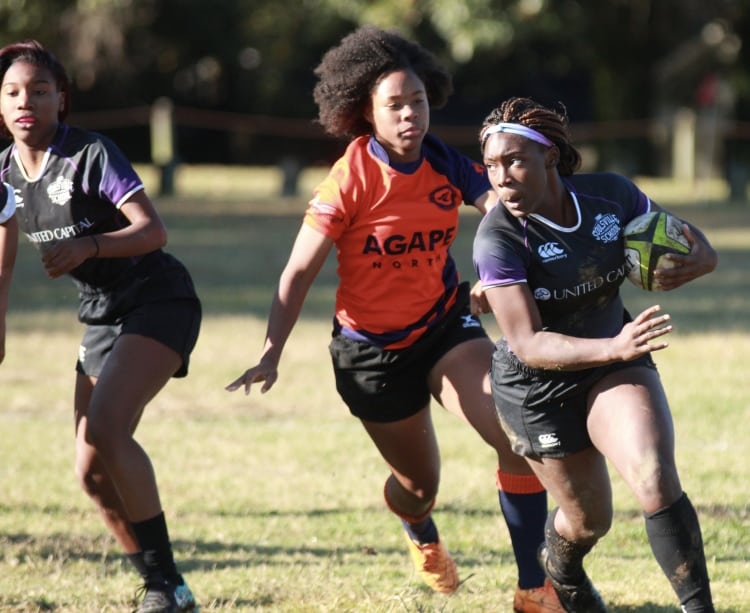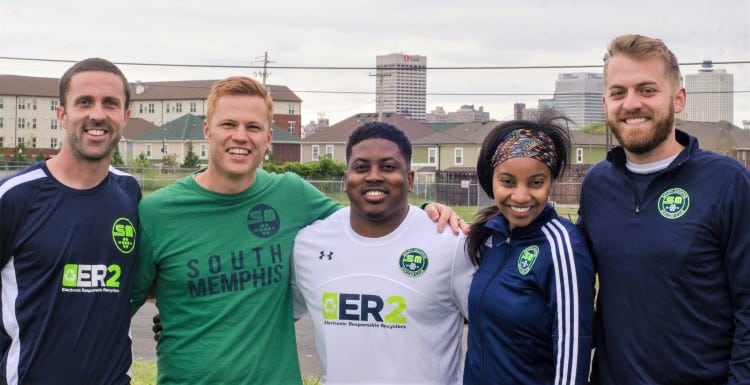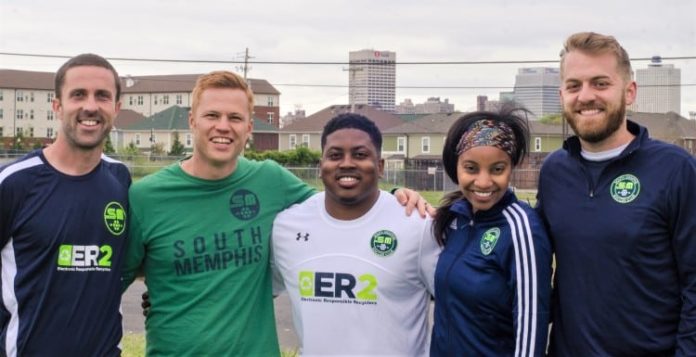The Bluff City is a basketball town located in the heart of college football country. But in South Memphis, rugby and soccer – two internationally popular sports not traditionally played in the neighborhood – are creating community by bringing neighbors together, creating athletic opportunities for students, and making healthy use of vacant land.
Targeting middle and high school students in ZIP code 38126, the volunteers of Memphis Inner City Rugby (MICR) have worked diligently for six years to expand academic and athletic opportunities for low-income students through the previously unfamiliar sport of rugby.
The organization was founded in 2012 by Teach for America colleagues Shane Young and Devin O’Brien. Young, a New Jersey native, fell in love with rugby after his father introduced him to the sport. He began playing at age 10 continued through college.
“Rugby is really cool because everyone gets the ball, you get to tackle, and it’s very physical,” Young said. “Team work and cooperation are required, and it builds unity. It’s such a great way to get a kid to embrace a new challenge, build great skills, character traits and habits, and you’re getting healthy.”
After Young graduated from Florida Gulf Coast University, Teach for America brought him to Goodlett Elementary School. His friend, New York native Devin O’Brien, was assigned to Kingsbury High School, and it was there that the rugby program that would evolve into MIRC began to take shape.
“We used Devin’s leverage at Kingsbury to recruit the players and start to build programming, holding practices and academic tutoring sessions,” said Young, now the rugby coach at Power Center Academy, where he also teaches ESL.
 Jayla Hampton (R) of Soulsville Charter School plays for Memphis Inner-City Rugby.
Jayla Hampton (R) of Soulsville Charter School plays for Memphis Inner-City Rugby.
From the get-go, Young and O’Brien wanted MICR program to be about more than just rugby with coaches also tracking academic performance and fostering academic growth and character building.
“Since we’re educators, we were able to help them become better students,” Young said. “Teachers in the building would react to the way the students would change and improve.”
MIRC expanded to bring competitive rugby programs to additional Memphis schools, and the program today serves about 140 student-athletes. Elements of the program include tutoring, mentoring, ACT/SAT prep, college readiness counseling, all-star camps and weightlifting.
Yoga became a component of the program with the support of sponsor Lululemon, a yoga and athletic wear brand that supports the MIRC yoga classes.
“All our athletes do yoga once a week in their schools for mindfulness, strength balance and injury prevention with some of the best yoga instructors in Memphis,” Young said.
In 2015, the program expanded to include women’s rugby. During that time Sanam Cotton launched MICR at Soulsville Charter School and Andres Lopez and Emily McElravey launched at Freedom Preparatory Academy.
Today, 40 percent of MIRC’s athletes — 98 percent who are African American — are girls, and those numbers continue to increase thanks to rugby’s growing popularity in the community and funding from organizations like the Women’s Foundation for a Greater Memphis.
Cotton, head rugby coach at Soulsville Charter School, said she became involved because the girls at her school showed an eagerness to play the sport their male peers had so enthusiastically embraced.
“Rugby offers girls the chance to engage in a way they never have,” she said. “It literally is the sport for any type of body and every type of body. I leverage rugby as a way for these powerful amazing black women to find their power and express it. They get to take up space and be celebrated for being powerful — not a powerful girl but being powerful. Rugby has changed my life and I hope to do the same with every girl rugby player I meet.”
Students from schools without rugby programs can play for other schools in the league. Players don’t pay to play, as the MIRC board raises funds, and MIRC has received grants from organizations such as The Atlas Foundation, a rugby-focused U.K.-based nonprofit. MIRC is the only North American rugby program supported by Atlas Foundation.
“Everyone is rallying around our kids,” Young said. “They’re so exciting to watch. They play with so much pride, have so much fun, and have embraced this new sport and made it so cool in their own communities … and we have so many rugby moms now.”
More than 20 MIRC alumni are playing college rugby around the country, from University of Memphis to Tufts University in Boston to Baylor University in Waco, Texas, and 11 of them are playing on rugby scholarships.
MICR is hoping to expand into Memphis elementary schools next year and continue reclaiming vacant and blighted properties in South Memphis by transforming them into athletic fields. Teams currently practice near schools in public parks, which are often overgrown.
“Sometimes they’re nicely mowed, and we’re grateful when that’s the case,” Young said. “It’s not an ideal surface, but we’re definitely happy with it because it’s free, it’s open, and it boosts that community dynamic. People walk by, they take an interest, and we’ve recruited some players that way. But the downside is none of our teams have a home field, and our games are technically all away games … we’re trying to take advantage of blighted areas we think can be turned into beautiful community centers where kids can play rugby. We could bring people to the city and host tournaments.”
 Members of South Memphis Soccer Club during a recent game at Tom Lee Park in Downtown Memphis. The growing club was established in 2016 as a way to bring together old and new neighbors in a family-friendly atmosphere.
Members of South Memphis Soccer Club during a recent game at Tom Lee Park in Downtown Memphis. The growing club was established in 2016 as a way to bring together old and new neighbors in a family-friendly atmosphere.
Meanwhile, in the same neighborhood, soccer is flourishing as an intergenerational community sport. In 2016, a group of friends and neighbors established The South Memphis Soccer Club.
“We started as a group of neighbors who, after we had kids, found we didn’t have the time to work out,” said Mike Shaw, who lives in South Memphis, where he works as an instructor at nonprofit Advance Memphis.
“We wanted to find a way to be together that was kid-friendly, and this has created a space where adults and families can be outside, doing something productive, and being physically fit. It’s something where the barriers to entry are lessened. It’s a sport where height, size, and speed doesn’t carry as much weight as in other sports, so it’s more intergenerational friendly.”
The South Memphis Soccer club plays at the now-closed Georgia Elementary School, and although it’s an informal adult league, middle and high schoolers often join the adults on the field. In addition to friendly scrimmages, club members engage in competitive matches with teams from soccer clubs in Binghampton, Midtown and other neighborhoods. Shaw said the matches give soccer fans from other parts of town the opportunity to get to know South Memphis.
“It’s kind of changed people’s minds about the neighborhood, and we’d like that to grow,” he said. “There’s a pride in representing your neighborhood. There are no referees, no trophies. You’re playing for your friends and your neighborhood. We get together for drinks afterwards, this interesting mix of people doing something positive together that builds community and is physically healthy.”
The South Memphis Soccer club team has jerseys sponsored by South Memphis recycling company ER2 and were awarded a grant from the Community LIFT Foundation for goals to post on local green spaces and vacant lots. Shaw said transforming vacant and blighted space into usable fields is a great byproduct of the community’s soccer movement.
South Memphis Soccer Club has an agreement with Cleaborn Pointe at Heritage Landing apartments to place practice goals in its mini-greenspace and playground area. The group hopes to have a permanent soccer field in the soon-to-be rebuilt L.E. Brown Park on South Orleans Street, which would be accessible to the entire neighborhood. Shaw said the City of Memphis has invited the South Memphis Soccer Club to participate in the park planning process.
“We hope there will be a dedicated space for soccer and rugby with permanent goals where we can congregate,” he said. “We think it can strengthen community pride, get people thinking differently about other parts of the city they haven’t been to, and have a positive experience with people from the neighborhood through soccer.
A lot folks coming out are new to the neighborhood, and it’s been a way to connect old neighbors with new neighbors.”



